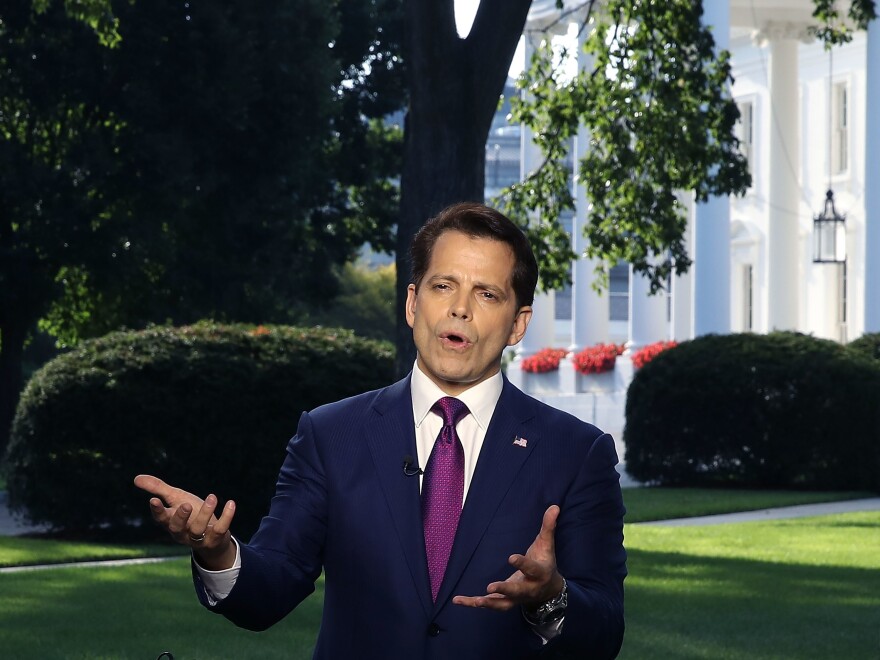The relationship between the United States and Saudi Arabia is at its lowest point in decades. But that hasn't stopped Wall Street executives and some of the world's wealthiest investors from gathering in Riyadh for a conference that's nicknamed "Davos in the Desert."
On Tuesday, Jamie Dimon and David Solomon, the CEOs of J.P. Morgan Chase and Goldman Sachs, respectively, shared a stage with billionaires Stephen Schwarzman, of The Blackstone Group, and Ray Dalio, who founded the world's largest hedge fund.
Former President Trump's son-in-law, Jared Kushner, also appeared at the Future Investment Initiative (FII) conference, and former Treasury Secretary Steven Mnuchin is scheduled to speak on Wednesday. Both Kushner and Mnuchin now run private equity funds backed by Saudi Arabia.
But no cabinet officials or senior staff from the Biden administration are there, because the White House is currently reevaluating its partnership with Saudi Arabia.

"This is definitely one of the lower points in U.S.-Saudi relations," says Karen Young, a senior research scholar at Columbia University's Center on Global Energy Policy.
Biden's disappointment over Saudi oil production cuts
President Biden, who has raised concern over the country's human rights record, is upset Crown Prince Mohammed bin Salman pushed for deep cuts to oil production earlier this month, which has led to higher energy prices.
At the same time, Saudi Arabia has a $600 billion government investment fund, and the country is telegraphing its ambitions beyond traditional energy.
There are panels at the conference on artificial intelligence, cryptocurrency, tourism and hospitality, and investing. Other speakers include Sam Bankman-Fried, the CEO of the cryptocurrency exchange FTX, and Ben Horowitz, one of the world's best-known venture capitalists.

A more assertive and confident Saudi Arabia has emerged
Young says Saudi Arabia is trying to signal to the wider world that it "has changed."
"It's an assertiveness in foreign policy," she observes. "It's a confidence in the Kingdom's ability to attract investment, and to be a player in a much larger field."
This week, there are opportunities to broker deals on the sidelines of the conference, but Young says the conference is above all else a public relations tool.
"This is much more about image," she says. "It's about a kind of ideology of the future of the Kingdom, and frankly, more of a public relations effort than a place where I think we're going to see real commitments of foreign direct investment in building companies in the Kingdom."
Despite its recent reservations about Saudi Arabia, the Biden administration says it did not advise U.S. companies to stay away from the conference, or the country.
"American companies will make their own decisions about their presence and where to invest, taking into account a range of factors including legal constraints, the business environment, and reputational concerns that can arise from public policy choices made by host countries," said Karine Jean-Pierre, the White House press secretary.

It hasn't been smooth sailing for Davos in the Desert
The conference, which started in 2017, has had aspirations of competing with the World Economic Forum's annual meetings in Davos, Switzerland, which have been convening for more than half a century. They regularly attract a who's who of global leaders, economists and political scientists, and media personalities.
Saudi Arabia's FII conference has faced setbacks from the start.
In 2018, Washington Post columnist Jamal Khashoggi was killed three weeks before the conference was scheduled to start, and at the last minute, many executives decided not to attend. Since then, the U.S. intelligence community has determined the killing was authorized by Crown Prince Mohammed bin Salman.
But in recent years, many CEOs have returned to Riyadh, drawn by the opportunity to mix and mingle, and to land lucrative contracts with the Saudi government.
Someone who never stayed away is Anthony Scaramucci, who is perhaps best known for his days-long tenure as former President Trump's communications director. He is currently a managing partner at SkyBridge, an investment firm he founded.
In an interview before he traveled to Saudi Arabia, Scaramucci said the country is "not perfect." But he suggested its recent efforts to modernize under the crown prince are laudable.
"It's moving in the right direction," he said. "And as business people, I think we have to do our best to help them continue that progress."

Asked about the killing of Khashoggi, Scaramucci called it "a tragedy." But then asked: "Are we capable of moving past that now?"
"It's an event that has to be recognized as a tragedy," he continued. "But I think we have to look at the longer-term goals and the longer-term interests of global peace, global prosperity, and frankly, global progress."
The killing didn't come up at a roundtable discussion moderated by CNN's Richard Quest, featuring Dimon, Solomon, Schwarzman, Dalio and a handful of other executives. Several participants said they were glad to be meeting in person again, after years of COVID-related travel restrictions.
Asked about the future of U.S.-Saudi relations, Dimon said he is optimistic.
"Saudi Arabia and the United States have been allies for 75 years," he noted. "I can't imagine any allies agreeing on everything, and not having problems. They'll work it through."
Copyright 2022 NPR. To see more, visit https://www.npr.org.



